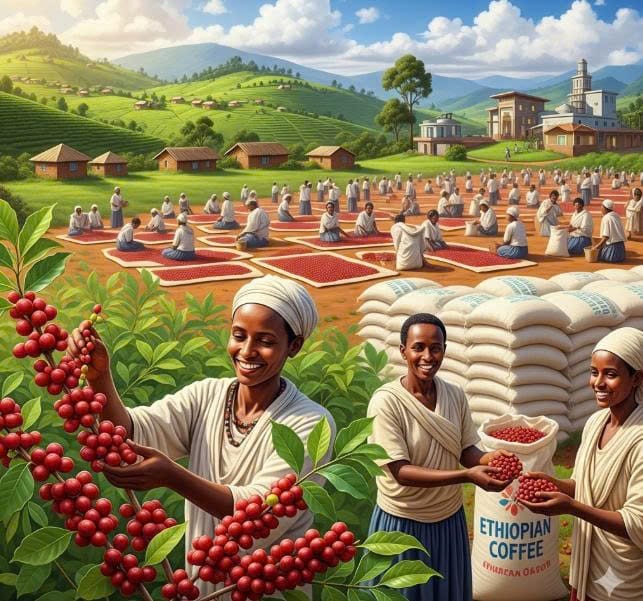báo cà phê—Beijing/Addis Ababa, September 8, 2025 — Ethiopia and China are set to strengthen cooperation in coffee, culture, and tourism as the two countries announced plans for the first Ethiopia-China Coffee Culture Festival, scheduled to take place before the 2026 Spring Festival.
The announcement was made at a press conference held at the Embassy of Ethiopia in Beijing, attended by Ethiopian officials, Chinese representatives, and media. Shi Feng, Secretary-General of the Ethiopia-China Friendship and Cooperation Committee, revealed that the festival will adopt a hybrid format with both online and offline activities, including coffee lectures and coffee roasting competitions.
Ethiopian Ambassador to China Teshome Taffera expressed confidence that the festival would enhance the visibility of Ethiopian coffee in China, one of the fastest-growing coffee markets in the world. He also disclosed that the Ethiopian Embassy is organizing a Chinese business delegation to visit Ethiopia in October 2025. The delegation will explore cooperation opportunities in sectors such as coffee, agriculture, manufacturing, new energy, and tourism.
Ambassador Taffera welcomed Chinese investment, stressing that partnerships would be mutually beneficial: “Such cooperation can help Chinese enterprises achieve their goals while advancing Ethiopia’s export ambitions. It is a win-win opportunity.”
Ethiopia’s Coffee Industry Surges
The press conference coincided with new data highlighting Ethiopia’s rapid coffee sector growth. According to the Ministry of Agriculture, coffee exports in the 2024/2025 fiscal year exceeded 468,000 tons, up by about 170,000 tons year-on-year. Export revenues reached a record-breaking 2.65 billion USD.
Agriculture Minister Addisu Arega, speaking in Addis Ababa, described coffee as a “major economic powerhouse” and credited the government’s Green Legacy Initiative for driving growth. The program has overseen the planting of billions of coffee seedlings, boosting production and ensuring sustainability.
“Just five years ago, Ethiopia’s coffee exports were under 200,000 tons, contributing little to foreign revenue,” Addisu recalled. “Now, the sector generates 2.7 billion USD annually and supports the livelihoods of more than 20 million farmers.”
Research institutions have also played a role by developing improved, climate-resilient coffee varieties with higher yields. These efforts aim to secure Ethiopia’s ambition of becoming the world’s second-largest coffee producer and exporter, further enhancing its global reputation.
With its deep-rooted coffee heritage and growing production capacity, Ethiopia remains Africa’s largest coffee producer and the world’s fifth-largest exporter of Arabica beans. Officials believe strengthened cooperation with China will not only expand market access but also foster broader economic ties between the two nations.

